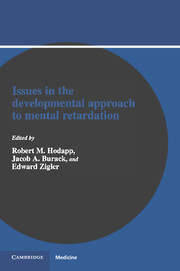Book contents
- Frontmatter
- Contents
- Preface
- Contributors
- Part 1 Developmental theory
- 1 The developmental perspective in the field of mental retardation
- 2 Differentiating mental retardation: The two-group approach and beyond
- 3 One road or many? Issues in the similar-sequence hypothesis
- 4 The similar-structure hypothesis and differential rate of development in mental retardation
- 5 Neo-environmental perspectives on developmental theory
- 6 The role of motivational factors in the functioning of mentally retarded individuals
- Part 2 Applying developmental theory to different types of retarded individuals
- Author index
- Subject index
1 - The developmental perspective in the field of mental retardation
from Part 1 - Developmental theory
Published online by Cambridge University Press: 07 September 2010
- Frontmatter
- Contents
- Preface
- Contributors
- Part 1 Developmental theory
- 1 The developmental perspective in the field of mental retardation
- 2 Differentiating mental retardation: The two-group approach and beyond
- 3 One road or many? Issues in the similar-sequence hypothesis
- 4 The similar-structure hypothesis and differential rate of development in mental retardation
- 5 Neo-environmental perspectives on developmental theory
- 6 The role of motivational factors in the functioning of mentally retarded individuals
- Part 2 Applying developmental theory to different types of retarded individuals
- Author index
- Subject index
Summary
The late 20th century is a challenging period for those concerned about development and developmental approaches to pathological populations. On the one hand, influential workers in the field of developmental psychology are questioning the very foundations of the discipline itself (Bronfenbrenner, Kessel, Kessen, & White, 1986). They question whether progressive development (i.e., change that leads to a specified end point) can be documented in any or all domains, and, if so, whether developmental progressions hold across all children in all contexts. Similarly, these workers raise issues about whether achievements are universal or are specific to one culture, and note that many changes that occur during childhood seem regressive in nature (e.g., Bever, 1982). All of these concerns, voiced by major figures in developmental psychology, throw into disarray long-held views about the very nature of human development.
On the other hand, there is a broad movement toward the developmental camp, as many people working with different groups purportedly employ “developmentally based” approaches. In the mental retardation (MR) field, we note the ubiquity of group homes, leisure-activity training, and even behavior-modification programs that are supposedly based on the principles of normal development. The term “development” here implies that the program promotes positive change over time or better adaptation to the environment. Given the imprecision in terminology, it is understandable that those who do not consider themselves to be developmentally oriented (e.g., Switzky, Rotatori, Miller, & Freagon, 1979) decry the use of the term at all.
- Type
- Chapter
- Information
- Publisher: Cambridge University PressPrint publication year: 1990
- 28
- Cited by



